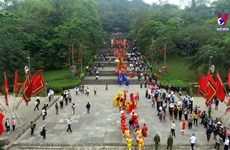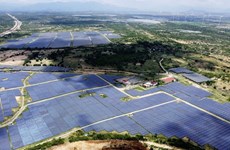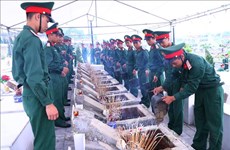Buddhist monk spends life saving rare bamboo species
Buddhist monk Thich The Tuong has been working hard to turn his one
hectare farm into a bamboo conservatory on the Son Tra Mountain in
central Da Nang city, which protects over 110 bamboo species.
Buddhist monk Thich The Tuong has been working hard to turn his one
hectare farm into a bamboo conservatory on the Son Tra Mountain in
central Da Nang city, which protects over 110 bamboo species.
Of these, four are almost considered extinct in Vietnam.
The garden, located on the Son Tra mountainside, eight kilometres from the city centre, is open to all visitors, who wish to see bamboo conservation in a rural setting, along with a fishing pond and a stone installation.
"The garden was donated by a farmer in Son Tra. I worked the land and grew different bamboo species that I had collected from different provinces," he recalled.
"I have collected a third of the total 300 bamboo varieties in Viet Nam. Bamboo plantation has grown over the past decade, dotting the sloping hills of the Son Tra Mountain."
He said he named the garden Son Tra Tinh Vien (Son Tra Tranquil garden).
The 48-year-old monk said he settled down in the area and started looking after the garden as he wanted to continue with his religious work and preserve the bamboo gene at the same time.
"I studied literature at Ho Chi Minh City's Social Sciences and Humanities College, so I found a connection among bamboo, literature and Buddhism," he explained.
"The Bamboo garden is my effort to preserve nature on the Son Tra Mountain, which has been recognised as a nature reserve. It would help protect the evergreen peninsula in the tourist city in the future," he said.
"Bamboo has inspired me to compose poems and literature, as well as lead a religious life. I have also created a tranquil corner in the garden for religious meditation," he said.
The monk added that the existence of the bamboo garden follows his life as a Buddhist.
Four bamboo species are listed in the Red Book of Vietnam, include the Truc den Ha Giang (Phyllostachys nigra Munro); Truc Hoa Long (Phyllostachys); Truc Vuong (Chimonobambusa quadrangularis); Tre Mien Nam (Sirocalamus aff latiflorus McClure). All have been growing well in the garden.
Le Thi Thoa, an ex-student of biology and environment at the Da Nang's Teachers' Training college, said the garden is a full of a collection of bamboo genes.
"I spent two years working on a thesis on bamboo, and the garden was my approach for research. The monk assisted me considerably in my study of bamboo," Thoa said.
"It is a precious garden of bamboo genes in Vietnam as bamboo forests on the riverheads have been over-exploited or destroyed. Bamboo is rare in villages as the local people prefer to grow cash crops or profitable plants," she said.
She said the development of more bamboo conservation centres will help protect valuable sources of flora and their genes in Vietnam.
"Bamboo also plays a role in biodiversity, along with other plants. It is a source of food for animals in the forest. Bamboo can slow down heavy floods in riverheads and smooth downstream flows," said Nguyen Thi Tinh, a biologist from the Frankfurt Zoological Society of Germany.
"Land for bamboo in rural villages has been reserved for easy money farming or urban development. So, the ever green plant has gradually disappeared," she said.
She said bamboo is also symbolic of the vitality and powerfulness of Vietnamese culture and its people.
The monk said he brought species from Japan, Thailand, India and Africa, whenever he visited these countries. "Bamboo can be grown as bonsai in a family garden or can be sold in the market. People just think bamboo is for construction of cottages, but it can be a source of craft in rural areas," he explained.
"Bamboo is also be used a raw material for production of bamboo charcoal-based toothpaste or tooth brushes in China and Korea," he said.
The garden is a favourite photography spot for young people on the weekends, since it is still rare to find a precious genes garden of bamboo in the central region.-VNA
Of these, four are almost considered extinct in Vietnam.
The garden, located on the Son Tra mountainside, eight kilometres from the city centre, is open to all visitors, who wish to see bamboo conservation in a rural setting, along with a fishing pond and a stone installation.
"The garden was donated by a farmer in Son Tra. I worked the land and grew different bamboo species that I had collected from different provinces," he recalled.
"I have collected a third of the total 300 bamboo varieties in Viet Nam. Bamboo plantation has grown over the past decade, dotting the sloping hills of the Son Tra Mountain."
He said he named the garden Son Tra Tinh Vien (Son Tra Tranquil garden).
The 48-year-old monk said he settled down in the area and started looking after the garden as he wanted to continue with his religious work and preserve the bamboo gene at the same time.
"I studied literature at Ho Chi Minh City's Social Sciences and Humanities College, so I found a connection among bamboo, literature and Buddhism," he explained.
"The Bamboo garden is my effort to preserve nature on the Son Tra Mountain, which has been recognised as a nature reserve. It would help protect the evergreen peninsula in the tourist city in the future," he said.
"Bamboo has inspired me to compose poems and literature, as well as lead a religious life. I have also created a tranquil corner in the garden for religious meditation," he said.
The monk added that the existence of the bamboo garden follows his life as a Buddhist.
Four bamboo species are listed in the Red Book of Vietnam, include the Truc den Ha Giang (Phyllostachys nigra Munro); Truc Hoa Long (Phyllostachys); Truc Vuong (Chimonobambusa quadrangularis); Tre Mien Nam (Sirocalamus aff latiflorus McClure). All have been growing well in the garden.
Le Thi Thoa, an ex-student of biology and environment at the Da Nang's Teachers' Training college, said the garden is a full of a collection of bamboo genes.
"I spent two years working on a thesis on bamboo, and the garden was my approach for research. The monk assisted me considerably in my study of bamboo," Thoa said.
"It is a precious garden of bamboo genes in Vietnam as bamboo forests on the riverheads have been over-exploited or destroyed. Bamboo is rare in villages as the local people prefer to grow cash crops or profitable plants," she said.
She said the development of more bamboo conservation centres will help protect valuable sources of flora and their genes in Vietnam.
"Bamboo also plays a role in biodiversity, along with other plants. It is a source of food for animals in the forest. Bamboo can slow down heavy floods in riverheads and smooth downstream flows," said Nguyen Thi Tinh, a biologist from the Frankfurt Zoological Society of Germany.
"Land for bamboo in rural villages has been reserved for easy money farming or urban development. So, the ever green plant has gradually disappeared," she said.
She said bamboo is also symbolic of the vitality and powerfulness of Vietnamese culture and its people.
The monk said he brought species from Japan, Thailand, India and Africa, whenever he visited these countries. "Bamboo can be grown as bonsai in a family garden or can be sold in the market. People just think bamboo is for construction of cottages, but it can be a source of craft in rural areas," he explained.
"Bamboo is also be used a raw material for production of bamboo charcoal-based toothpaste or tooth brushes in China and Korea," he said.
The garden is a favourite photography spot for young people on the weekends, since it is still rare to find a precious genes garden of bamboo in the central region.-VNA













